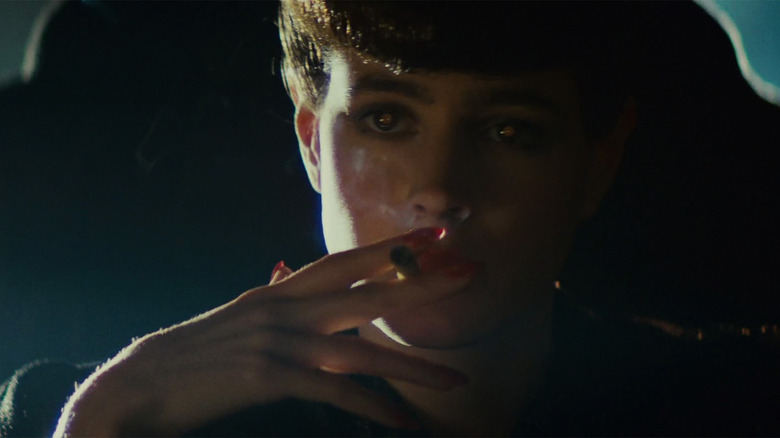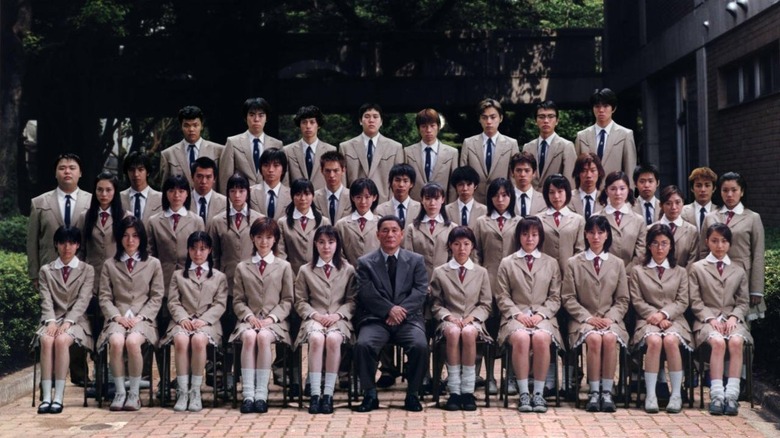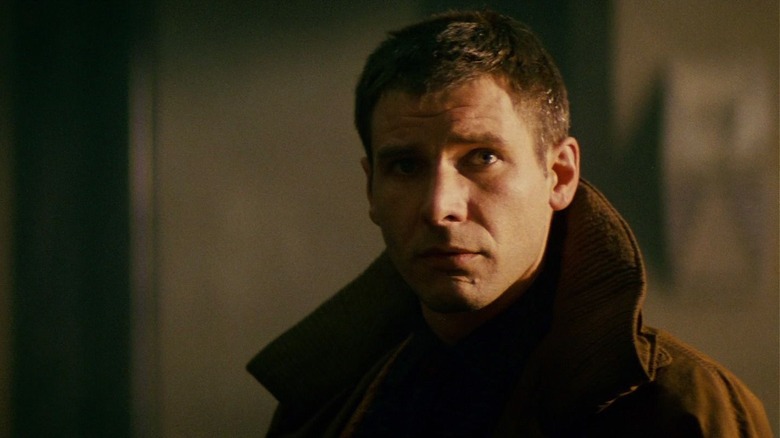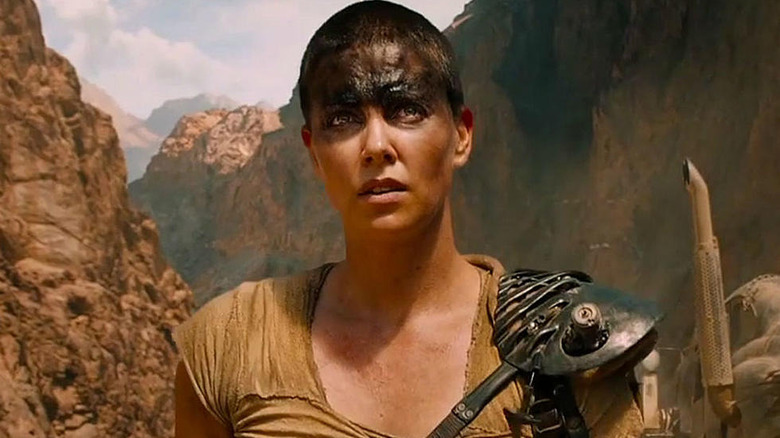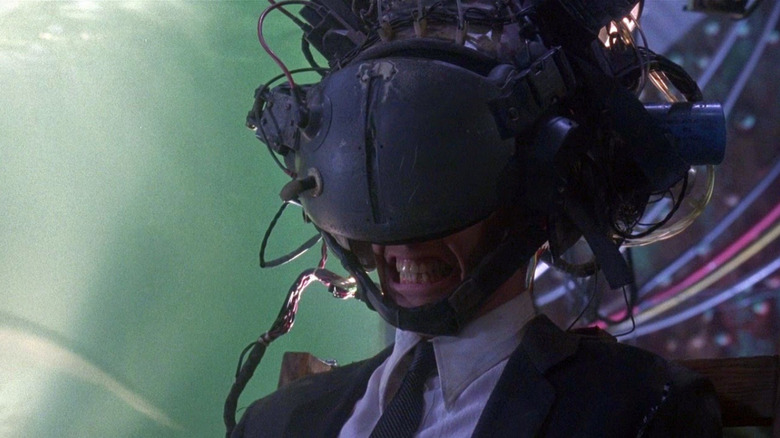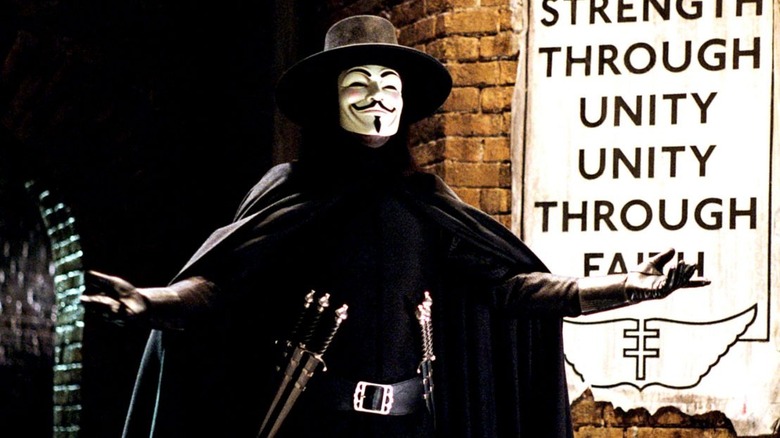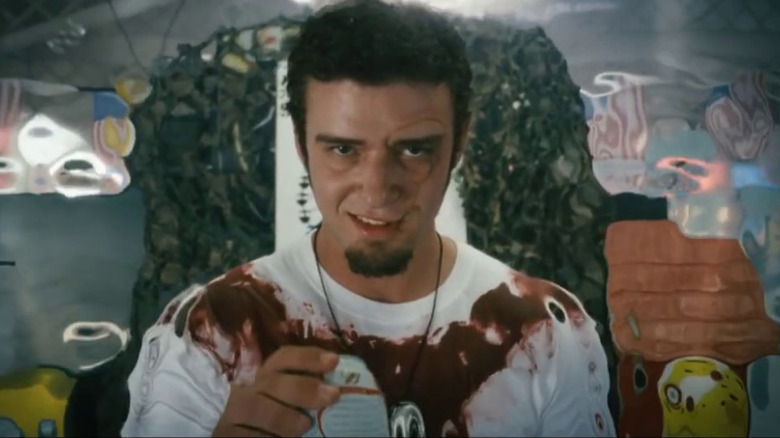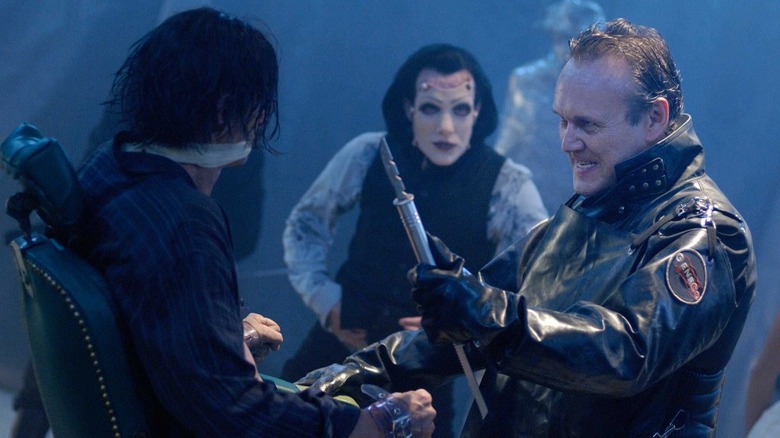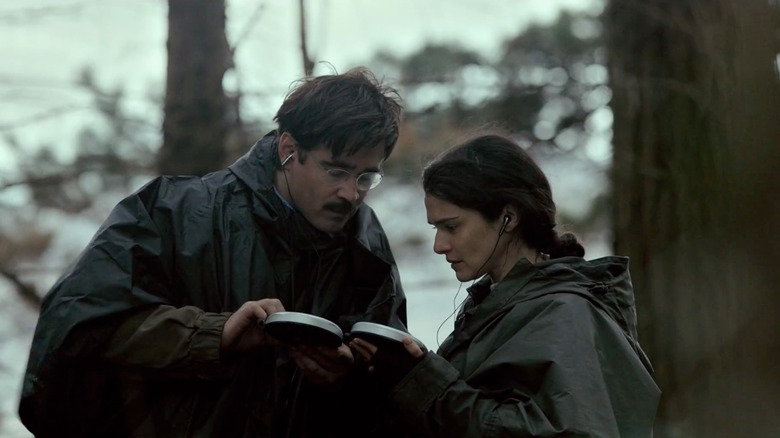8 Dystopian Movies That Are Better Than Our Current Hellscape
It is not an understatement to say that life in the United States right now is absolutely terrifying for the majority of its population. In 2016, a game show host won the highest seat of power in the country on a platform of lies and hatred, emboldening the worst of Americans to be angrier, louder, and more violent. More than 1 million Americans are dead from a pandemic, lives that could have potentially been saved with proper leadership and planning in public health instead of one president who publicized injecting bleach as a cure and one who can't seem to make a firm decision on anything. A sneakily stacked Supreme Court has just overturned Roe v. Wade with the potential to go after other landmark civil rights cases, revoking bodily autonomy from more than half of the population. Things are looking pretty bleak, and while sometimes looking to hopeful fiction like "Star Trek" can be a balm, sometimes a person needs to find comfort in a fictional dystopia to remind them of the tenacity of the human spirit and that there is good even in the worst of times.
Here are some of the best movie dystopias that provide an alternative to our current, real-life one. After all, if we're going to have to live through corporations owning everything, having no privacy whatsoever, and basically being in a boring version of a William Gibson story, shouldn't we at least have flying cars by now?
1. Battle Royale
Here's the most shocking difference between America in 2022 and the fictional future of the 2000 Japanese thriller "Battle Royale": in "Battle Royale," only one classroom of kids dies each year. In this cult classic film, based on the 1999 novel by Koushun Takami, the Japanese government passes the BR Act to curb juvenile delinquency after a brutal recession. One class of junior high students is selected each year to be taken to a remote island and fight to the death, with only a sole survivor being allowed to leave. The concept bears similarities to "The Hunger Games," though "Battle Royale" is much less fantastical and more harsh in its depictions of child-on-child violence. Adolescents are still learning how to make rational decisions and be empathetic, fully-formed adults, and giving them access to deadly weapons can only end in bloodshed.
Despite being increasingly difficult to watch as images of children with gunshot wounds have become all too real despite being preventable, "Battle Royale" offers a tiny sliver of hope. In the face of potential extermination, some of the students team up to overthrow the entire system instead of turning on one another. These brave few have the potential to change the world, and even though they're just a handful of Japanese school kids, we should all strive to be more like them.
2. Blade Runner
There are dozens of dystopian films about law enforcement, but many of them are satires that can unfortunately be mistaken for earnest pro-police propaganda, like "RoboCop" and "Dredd." The 1982 Ridley Scott science fiction classic "Blade Runner" follows Harrison Ford as a specialized kind of cop, a blade runner whose job is to hunt down rogue "replicants," who are nearly-human androids. In order to do his job well, Ford's character Deckard must see his targets as less than human, even though they have the same feelings and desires, and are in fact "more human than human." Dehumanization is a common tactic in America police force training, and it's a part of why there is so much police brutality on marginalized communities who find themselves on the end of such dehumanizing tactics.
Deckard ends up not even really being the hero of his own story, though he is forced to reconsider his life choices and his stance on replicants. This change is thrust upon him when he falls in love with a replicant named Rachael (Sean Young) who doesn't know she's a replicant, further blurring his own self-set ideas of who deserves human rights. By the time he comes to his final fatal confrontation with the replicant revolutionary, Roy Batty (Rutger Hauer), Deckard's faith in the system has been thoroughly shaken; afterward, he leaves his career completely. Though his actions aren't completely redeemed, Deckard is on the right path towards being a better person. In the end, it doesn't matter if he himself is a replicant or a human; only his actions matter.
3. Mad Max: Fury Road
All of George Miller's "Mad Max" movies are technically dystopian, as they all feature horrible civilizations created in the aftermath of an apocalyptic event, but 2015's "Mad Max: Fury Road" is perhaps the most hopeful of them all. The film follows franchise hero Max Rockatansky (Tom Hardy) after he's captured by a warlord called Immortan Joe (Hugh Keays-Byrne) who controls all of the water for the region. He ends up helping out one of the warlord's rebellious soldiers, Imperator Furiosa (Charlize Theron), free Immortan Joe's enslaved "wives," and escape into the wasteland in search of a promised land. The world of "Fury Road" may seem like the stuff of fantasy, but climate change and corporate and government inaction to slow it unfortunately make a world of extreme weather, battles for remaining resources, and massive human loss pretty likely for our own future. It can feel a little hopeless.
The two primary heroes of "Fury Road," Max and Furiosa, both have a pretty frustrating relationship with hope. Max believes it's foolish to hang onto, while Furiosa clings to hope in an imaginary future. When they realize that their greatest chance of survival is to return to the very place they escaped from in order to make it better for everyone, it's revelatory. Sometimes the hardest thing is to not run away, but to stay and fight together for what's important. When they put together their plan, the terminally ill war boy Nux (Nicholas Hoult) says it "feels like hope." Hope is something we have to make for ourselves, no matter how hard it might be.
4. Johnny Mnemonic
There are many cyberpunk dystopias, from the oil-slicked beauty of "Blade Runner" to the allegory-heavy action of "The Matrix," but no one knows how to tap into the weirdness of the internet, identity theft, and corporate abuses of technology quite like author William Gibson. This 1995 movie was based on his short story of the same name, and though some people absolutely loathe this weird mid-90s slice of sci-fi, it's actually a pretty impressive indicator of our own weird future. In "Johnny Mnemonic," the titular Johnny (Keanu Reeves) transfers secret data for corporations in his own brain. Privacy is non-existent, so keeping information secret is of the utmost importance, and Johnny basically volunteers as a human data drive in exchange for money. The problem is that too much time plugged into the internet can kill you, and Johnny ends up with some truly deadly data in his gray matter.
Data privacy is a huge problem for Americans, whose protections waver between "minimal" and "non-existent," and it's not all that hard to imagine a future where people endanger their health to hide secret information for a paycheck. It's probably already happening, albeit in a less physical, sci-fi body horror kind of way. The one thing that makes the world of "Johnny Mnemonic" better than ours is that there's a dolphin who can talk and he does LSD. Look, sometimes you have to appreciate the little things.
5. V For Vendetta
The Wachowski sisters have written about dystopias pretty extensively, including their masterpiece, "The Matrix," but their greatest contribution to the sub-genre might actually be their script for "V for Vendetta." The Wachowskis took Alan Moore and David Lloyd's seminal graphic novel and turned it from a genius work about totalitarian governments and the people who overthrow them into an even more brilliant work on the tenacity and diversity of the human spirit. The Guy Fawkes mask worn by the titular "V" (Hugo Weaving) has been co-opted by the hacker group Anonymous, which makes sense because it represents a faceless rebellion. The real heroes of "V for Vendetta" are the many regular people that stand up in the face of injustice, some just by living their lives. Throughout the film we see the effects of the totalitarian regime on anyone who doesn't fit its ideals: LGBTQ+ people, people of non-Christian faiths, and immigrants among them. Evey Hammond (Natalie Portman), who is captured and tortured by V in order to be radicalized, is the real hero of the story, and she doesn't even want that honor.
"V for Vendetta" is a powerful reminder that "terrorist" and "freedom fighter" are two sides of the same coin, determined almost entirely by perspective. Moore's story was about a distressing rise in white nationalism in the U.K. in the 1980s and the Wachowski's story was about the dangers of Bush-era political strategies that revoked basic freedoms, like the Patriot Act, but it's still eerily relevant today. After all, "'People shouldn't be afraid of their government. Governments should be afraid of their people."
6. Southland Tales
Richard Kelly's 2006 sci-fi comedy "Southland Tales" is fairly divisive, with die-hard fans willing to defend it as a flawed but prescient masterpiece and others who dismiss it as incomprehensible nonsense. I'm in the former category, and "Southland Tales" has only become more relevant as time has passed. This gonzo story of the apocalypse handily tackles the mistreatment of members of the military by those in power, police brutality, the dangers of misinformation in the media, radicalization through pop culture, and the effects of capitalism on democracy. It's buckwild stuff that's occasionally a little hard to process, especially given that there are graphic novels that take place before the events of the film and help set things up. However, much like being born into this country, we start the "Southland Tales" downward spiral in media res, that is, right in the middle of things. It feels appropriate, somehow, given how much of our current situation has been handed down to us from those who came before.
While "Southland Tales" ends with a bonafide global apocalypse, it's hard not to see that ending as a win for many of the characters who have finally been given agency. Sometimes we have to blow it all up in order to start anew, as the damaged souls of "Southland Tales" know all too well. And hey, at least their pale horse of Death is an ice cream truck. Who doesn't love ice cream?
7. Repo! The Genetic Opera
The monumentally ridiculous but somehow deeply relevant rock opera "Repo! The Genetic Opera" is a fascinating take on bodily autonomy, control, and capitalism. In an alternate near-future, genetic and body modification has become more than just a form of self-expression: it has become an important status symbol. Just as Americans struggle to receive and afford healthcare, the people of the movie's strange future must struggle to pay their surgical bills — or else. Those who can't make their payments get their organs repossessed, ripped from them by the corporate cops, called Repo men. One such Repo man keeps his teenage daughter sedated and drugged to mimic a chronic illness in order to prevent her from going out into this cruel, dangerous world, making her one of the only people in this weird world without the choice to make their own decisions with their body, as long as they can pay for it.
Yes, "Repo! The Genetic Opera" takes place in a terrifying hell world where life is cheap and everyone's hopped up on glowing blue magic morphine called Zydrate, but at least there, no one would have asked for my husband's permission before I could get a hysterectomy. It's a capitalist nightmare, but people still (mostly) have a choice over their own bodies. For people with uteruses in many places in the United States, that's no longer guaranteed.
8. The Lobster
In Yorgos Lanthimos' 2015 surreal black comedy "The Lobster," single adults are sent to a special hotel where they are meant to find their soulmate. If they are unable to find a "well-suited mate" within 45 days, they are then turned into the animal of their choice. Colin Farrell's protagonist chooses to become a lobster if he can't find love, but ends up finding it in an unlikely place after breaking out of the hotel and meeting a clan of single adults living in the forest who have outlawed the sentiment.
"The Lobster" is a bleak but deeply funny commentary on love, societal expectations, and identity, but most importantly: at this point, I think I might rather go ahead and be turned into a lobster.
